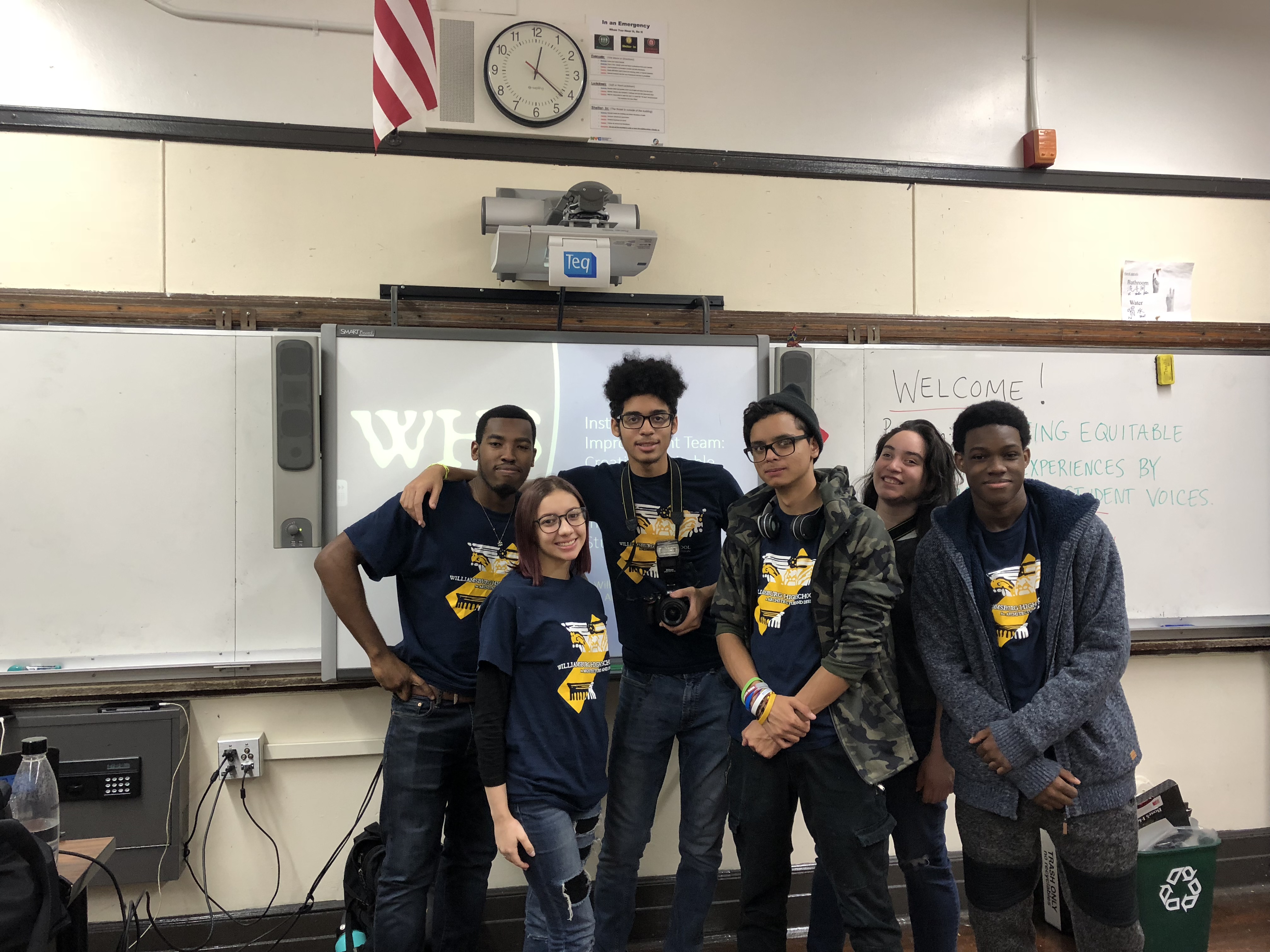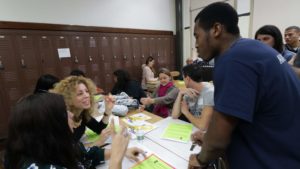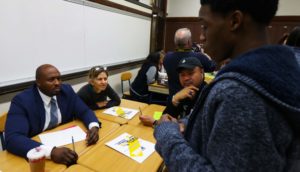
Thank you to our team of students who participated in the professional development session. You all make buy-in for such a program easy.
In any professional practice, development is essential. In order to stay abreast of new ideas, reliable techniques, and valuable data points, one must work to explore what is out there so that one may provide continuously improving service to those served. On November 6th, educators from North Brooklyn received opportunities to strengthen their professional practices during Brooklyn North High School’s Day of Equity and Rigor at Brooklyn Technical High School. Hundreds of educators received insights from speakers Josh Johnson, Glenn Singleton, Dr. Gholdy Muhammed, Superintendent Janice Ross, and Executive Superintendent Karen Watts. Additionally, WHSAD’s neighbor school, Brooklyn Preparatory High School showcased some of its more poetic students reading their “Where I’m From…” pieces.
In the afternoon, break-out sessions commenced and WHSAD’s intervisitation team, made up of both staff and students, presented to eager educators about the process of developing the team, the benefits of doing such work, and the future goals of the group in its effort to create more equity and autonomy at WHSAD.
Thank you to Superintendent Janice Ross and Executive Superintendent Karen Watts for arranging the day and to the staff of Brooklyn Technical High School for hosting all the educators for such an enlightening event.
Below, students and staff provide their thoughts regarding the student-staff intervisitation concept and what it was like presenting to New York City educators.

Jared Jackson speaks with educators about his experience visiting classrooms and debriefing with teachers.
Senior Jared Jackson said the professional development session was “an interesting experience due to the specific topic and because those teachers present were interested in incorporating some aspects of the instructional improvement team in their schools.”
Additionally, Jackson noted “it provides teachers with a different point of view pertaining to their teachings. Being a student is what makes this experience unique. The fact that the Instructional Intervisitation Team can constructively criticize the teacher for the sole purpose of benefiting other students and even the teacher is extremely empowering for students.”
Senior Cecilia Gerena believes that the presentation was “impactful” and feels “like more schools should bring students in to work with teachers to get more insights as to how the students feel.”
Cecilia also observed that from her participation in the intervisitation team she has “learned what autonomy means” and “can work better teaching [herself] and others what it means and how to use it in the classroom.”
Junior Johnathan Walker said the session felt “welcoming in the sense that [they] were able to communicate what [they] have been doing to help students and teachers out to have a better environment.”
He also believes that the intervisitation experience has “helped [him] communicate [his] thoughts better” which matters a great deal when working in groups and in the world beyond high school.
Ms. McCollum, WHSAD’s Algebra 2 teacher, said that due to student visits “observations have become something to welcome, not dread.” Additionally, in terms of future goals, she aspires to get “more students participating so that more voices are heard. More student representatives strengthen WHSAD’s culture,” and wonders “could our current students visit us and provide feedback from BOTH the intervisitation AND individual classroom experience?”
Ms. Weinstein, WHSAD’s U.S. History teacher, related that “the purpose of student intervisitations is to provide insight into teacher practice from the lens of the students. Because our teaching and practice is all about their learning, it is important to take their viewpoints into consideration.”
Regarding the process of developing, Ms. Weinstein said, “Since their inception, student intervisitations have grown tremendously. They began with a select group of seniors acting as tour guides for visitors, but they have grown into a group of students who still act as tour guides but also participate in visits and debriefs, interact with students during visits, and act as mentors for new students joining the group. They are now beginning to provide feedback to a teacher directly.”
In terms of the future, Ms. Weinstein looks “for the students to be able to give feedback to a teacher directly, rather than to the teacher with whom they observed. We are also going to expand the group in the coming weeks.”
And finally, in terms of student growth, she reflected, “Students who have participated have grown tremendously! Many of them started as shy and introverted, and now they gained the confidence to speak in front of a group of 20 teachers whom they have never met. They have learned how to respectfully voice their opinions, listen while others speak, and present themselves as leaders in the classroom.”

Johnathan Walker continues to refine his communication skills as he relates ideas from his experience on the intervisitation team.
Pia Moos, WHSAD’s Building and Design teacher, said, “The purpose of the intervisitations is to have the students’ voices reflected in the development of a student-centered classroom. Further, student point of view is an important piece in understanding if and how learners receive/perceive pedagogical methods. By having students participate in the development of pedagogical methods/settings they become active participants in forming their learning environment.”
In terms of future goals, Ms. Moos wants WHSAD to “have more students involved, especially students with IEPs.”
According to WHSAD’s Algebra 1 teacher, Zack Leverenz, the “purpose of student visitations is to see the classroom from the eye of a student, being that most teachers haven’t been in a classroom in years nor ever seen themselves teach, student feedback is a valuable perspective most of us never ask for or get.”
As for the progression of the program, Leverenz notes, “since their inception, intervisitations have become more organized and instructive due to feedback and rubrics. Also we have moved from content area to cohort level.”
Hopefully, the participants in the session left enthusiastic about such a tremendous opportunity to involve students more greatly in the educational process, and thus truly establish a school that puts equity and rigor at the center of its instructional practices.


